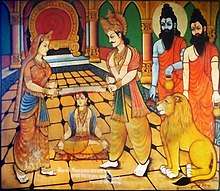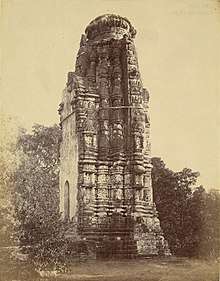Arang
Arang, also known as "The town of temples" of Chhattisgarh, is a block and a Nagar Palika in Raipur District in the state of Chhattisgarh, India. It is situated near the eastern limits of Raipur City and close to Mahasamund City. Arang is an ancient town, which was ruled by the Haihayas Rajput dynasty. It is famous for its many Jain and Hindu temples which belong to the 11th and 12th centuries; these are the Mand Deval Jain temple, the Mahamaya temple, the Panchmukhi temple and the Hanuman temple. Due the Archaeological finds of a copper plate inscription dated to the Gupta Empire, known as the Arang Plate of Bhimasena II of the clan of Rajarsitulya, has established the town's ancient history as a Hindu and Jain religious centre, which was then under the rule of Hindu kings. The Mand Deval Jain temple is the most ancient of these temples dated to the 11th century where three huge images of Digambara tirthankaras are deified in the sanctum sanctorum; these are carved in black stone and polished.

Economic activity in the town is mostly related to small scale industries of rice and pulse mills, and many types of forest products. Religious tourism is receiving attention.
History
The name Arang is formed of two words ara meaning "saw" and anga meaning "body". According to a legend, god Krishna appeared disguised as a Brahmin before king Murddhawaja (Mordhwaj) of the Haihaya dynasty. The pious king offered him whatever dakshina he wanted.[1] The disguised Brahmin asked for one half of the king's body. The king immediately ordered that he be sawed off, and one half given as dakshina. As he was about to be cut in half, a tear drop fell from one of the eyes.[1] The Brahmin asked the king if the tear drop reflected his regret in accepting his request. The king replied no, adding that the half of the body which he did not ask for weeps as it too would like to be a part of the dakshina. Krishna then revealed himself and blessed the king for his devotion.[1]
Arang was ruled in ancient times by the Haihayas Rajput dynasty.[2] Archaeological finds establishes that the town had an ancient history as the centre of Hindu and Jain religious faiths.[3] Arang also finds mention in the Hindu epic Mahabharata.[4]
An archaeological antiquary in the form a copper plate inscription dated to the Gupta period, known as the Arang Plate of Bhimasena II of the clan of Rajarsitulya was unearthed at Arang. It attests to the reign of this dynasty over Chhattisgarh, particularly of Bhimasena II and five rulers who preceded him. It is inferred that they were vassals of the Gupta Empire.[5]
Archaeological finds in Arang also included few Jain images made of gem stones, which are now preserved in the Digambar Jain temple at Raipur.[6]
Another historical legend attributed to Arang in particular, and Chhattisgarh in general, relates to the princess Chandini and her lover Lorik. This legend is in the form of folk-poetry which is widely sung in the state. A memorial statue in their honour exists near Arang.[7]
Geography and climate
Arang, a prosperous ancient town, known for its many Jain and Hindu temples, is located on the west bank of the Mahanadi River, a Nagar Palika in Raipur District in Chhattisgarh,[8][2][3] at 21.2°N 81.97°E. It has an average elevation of 267 metres (876 ft). It is 36 kilometres (22 mi) from Raipur on National Highway 53 (N.H.53), a four lane expressway to Durg passing through Arang. It is 15 kilometres (9.3 mi) from Mahasamund city.[9][10] There is also a two lane road from Arang to Tumgaon. The nearest airport is the Raipur Airport situated near Mana Camp , which is 23.8 kilometres (14.8 mi) away from Arang.[11]
Climate
According to the Köppen-Geiger classification, Arang has a Temperate or subtropical hot-summer climate with nomenclature as Cwa. The average annual rainfall is 589 millimetres (23.2 in) with July and August recording the maximum. The average temperature is 22.2 °C (72.0 °F) with a maximum of 40.9 °C (105.6 °F) and a minimum of 3 °C (37 °F). June is the hottest month of the year with average temperature of 33.1 °C (91.6 °F) and January recording the lowest.[12]
| Climate data for Arang | |||||||||||||
|---|---|---|---|---|---|---|---|---|---|---|---|---|---|
| Month | Jan | Feb | Mar | Apr | May | Jun | Jul | Aug | Sep | Oct | Nov | Dec | Year |
| Record high °C (°F) | 18.0 (64.4) |
19.4 (66.9) |
24.5 (76.1) |
30.2 (86.4) |
36.2 (97.2) |
40.9 (105.6) |
37.5 (99.5) |
35.3 (95.5) |
34.7 (94.5) |
31.6 (88.9) |
25.6 (78.1) |
19.9 (67.8) |
40.9 (105.6) |
| Daily mean °C (°F) | 10.5 (50.9) |
12.6 (54.7) |
17.6 (63.7) |
22.8 (73.0) |
28.2 (82.8) |
33.1 (91.6) |
31.6 (88.9) |
30.0 (86.0) |
28.4 (83.1) |
23.4 (74.1) |
17.0 (62.6) |
11.8 (53.2) |
22.3 (72.1) |
| Record low °C (°F) | 3.0 (37.4) |
5.9 (42.6) |
10.7 (51.3) |
15.5 (59.9) |
20.3 (68.5) |
25.3 (77.5) |
25.7 (78.3) |
24.7 (76.5) |
22.5 (72.5) |
15.3 (59.5) |
8.5 (47.3) |
3.8 (38.8) |
3.0 (37.4) |
| Average precipitation mm (inches) | 48 (1.9) |
49 (1.9) |
57 (2.2) |
40 (1.6) |
22 (0.9) |
25 (1.0) |
107 (4.2) |
136 (5.4) |
58 (2.3) |
12 (0.5) |
9 (0.4) |
26 (1.0) |
589 (23.3) |
| Source: Climate: Arang[12] | |||||||||||||
Demographics
As of 2001 India census,[13] Arang had a population of 16,593. Males constituted 51% of the population and females 49%. Arang had an average literacy rate of 64%, higher than the national average of 59.5%; with 60% of the males and 40% of females literate. 16% of the population is under 6 years of age.[13] As of 2011, the population reported was 19,091, an increase of 1.3% over the 2001 figure, which gives a density figure of 812.7/km² over the Nagar Panchayat area of 23.49 square kilometres (9.07 sq mi).[14]
Economy
Economic activity is in the form of small scale industries of rice and pulses mills.[15] It is a commercial town where various types of forest products are marketed.[16]
Arang is one of the three locations chosen for community development in its Chandkhuri development block.[17]
Temples
Arang has many Jain and Hindu temples that are dated to the 11th and 12th centuries. Archaeological excavations carried out in the town has confirmed the town's ancient history as a Hindu and Jain religious centre, which prospered under the rule of Hindu kings.[3]
The ancient temples in Arang, which are tourist attractions are: the Mand deval temple, the Mahamaya temple, the Danteshwari temple, the Chandi Maheshwari temple, the Panchmukhi Mahadev temple, and the Panchmukhi Hanuman temple. Of these, the Mand Dewal temple and Bagh Deval temple are particularly ancient and well-known.[3]
Mand Dewal temple

Mand Dewal temple, a Jain temple dated to the late eleventh century, is in the Mahakosala area of Arang. It is built in the Bhumija style of architecture.[18] The plinth of this temple has detailed ornamentation. It has a socle plinth that supports a pedestal, and two rows of sculptures on the wall. The temple layout plan is in a star shape known as stellate (meaning: shaped like a star, having points, or rays radiating from a center) with six "offsets". The temple rises to five floors, which is considered an unusual feature.[8][18][19]
The temple faces west and is in rundown condition. In the past, a mandapa (an outdoor pavilion) and a porch probably existed as part of the temple. The temple has three free standing large images of Jain tirthankaras deified in the garbha griha or sanctum sanctorum.[19] These are carved ornately in black stone and highly polished. The three tirthankaras are Ajitanatha, Neminath and Shreyanasanatha.[20] The central figure is adorned with the symbol of a wheel holding two deers in the left hand, and a globe on the right hand. The base of this image has a "winged figure" carving. Carved images also embellish the exterior faces of the temple.[19]
Mand Deval temple
Bagh Deval temple, which was inferred initially as a Jain temple, is dated to the 11th century. It has similar architectural features as the Khajuraho temple.[21][21]
See also
- Champaran (Chhattisgarh), held sacred as the birthplace of Saint Vallabhacharya is nearby.
References
- Alexander Cunningham (1884). Report of a Tour in the Central Provinces and Lower Gangetic Doab in 1881-82. p. 74.
- Garg 1992, p. 578.
- Provinces 1909, p. 259.
- Surjan & Verma 1996, p. 18.
- Misra 2003, p. 8.
- Madhya Pradesh (India); V. S. Krishnan (1973). Madhya Pradesh District Gazetteers: Dewas. Government Central Press.
- Dube, S. C. (1947). "Field Songs Of Chhattisgarh". The Universal Publishers Ltd.
- "Chhattisgarh State". Rotary Club.
- Andhra Historical Research Society (1930). Journal of the Andhra Historical Society. Rajahmundry, Madras: Andhra Historical Research Society.
- "Arang". Falling Rain Genomics, Inc.
- "Closest Airport to Arang". Closestairportto.com. Retrieved 30 June 2016.
- "Climate: Arang". Climate-Data Organization. Archived from the original on 21 September 2016. Retrieved 31 August 2016.
- "Census of India 2001: Data from the 2001 Census, including cities, villages and towns (Provisional)". Arang. Census Commission of India. Archived from the original on 16 June 2004. Retrieved 1 November 2008.
- "ARANG (Raipur)". City Population Organization.
- Dr. Lal & Jain (1 September 2010). Chhattisgarh Pre-B. Ed. Examination. Upkar Prakashan. pp. 1–. ISBN 978-81-7482-934-4.
- Deshmukh; I.C.S. (1 January 1996). Course Of My Life (Centenary ed.). Orient Blackswan. p. 70. ISBN 978-81-250-0824-8.
- Pradesh 1964, p. 59.
- Jain 1972, p. 446.
- Beglar, Joseph David (1873). "Three sculptures of Jain tirthankaras in the Bhand Dewal Temple, Arang". On Line Gallery British Library.
- "Ganesh au Chhattisgarh". Ganesh, dieu de l'hindouisme.
- Lalit Surjan; Vinod Verma (1996). Reference Deśabandhu Madhya Pradesh. Deshbandhu Publication Division. p. 249.
Bibliography
| Wikivoyage has a travel guide for Arang. |
- Garg, Gaṅgā Rām (1992). Encyclopaedia of the Hindu World. Concept Publishing Company. ISBN 978-81-7022-376-4.CS1 maint: ref=harv (link)
- Jain, Kailash Chand (1972). Malwa Through the Ages, from the Earliest Times to 1305 A.D. Motilal Banarsidass. ISBN 978-81-208-0824-9.CS1 maint: ref=harv (link)
- Kumar, Brajesh (2003). Pilgrimage Centres of India. Diamond Pocket Books (P) Ltd. ISBN 978-81-7182-185-3.CS1 maint: ref=harv (link)
- Misra, Om Prakash (2003). Archaeological Excavations in Central India: Madhya Pradesh and Chhattisgarh. Mittal Publications. ISBN 978-81-7099-874-7.CS1 maint: ref=harv (link)
- Pradesh, India (Republic). Superintendent of Census Operations, Madhya (1964). District Census Handbook, Madhya Pradesh, Census of India, 1961. Government of Madhya Pradesh.CS1 maint: ref=harv (link)
- Provinces, Central (1909). Raipur district. Printed at the Pioneer Press.CS1 maint: ref=harv (link)
- Surjan, Lalit; Verma, Vinod (1996). Reference Deśabandhu Madhya Pradesh. Deshbandhu Publication Division.CS1 maint: ref=harv (link)